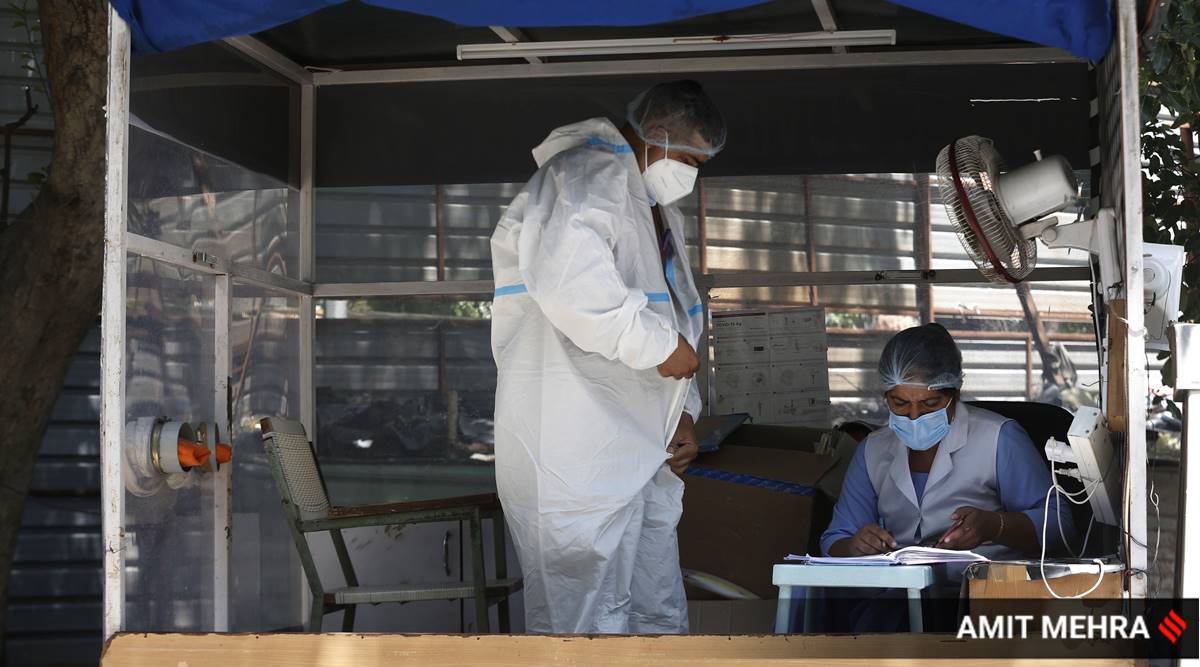 Healthcare professionals have been infected by the coronavirus. This also has a huge impact on their mental health.
Healthcare professionals have been infected by the coronavirus. This also has a huge impact on their mental health.By Kapil Sharma
As India and the world grapple with the COVID-19 global pandemic, frontline healthcare workers are facing some of the most challenging times of their lives. Doctors, nurses, ward boys, sanitation workers, security guards are continuing to risk their lives to treat patients and ensure their dignity. Medical professionals work demanding shifts wearing uncomfortable personal protective equipment (PPE) while making life-saving decisions under extreme pressure. Some of these decisions include allocating limited resources for severely ill patients. Combined with fatigue, this can lead to an imbalance in their own physical and mental well-being.
Healthcare professionals have been infected by the coronavirus and many have lost colleagues to this disease. This also has a huge impact on their mental health. Hospital staff who are quarantined often feel guilty about leaving the facilities understaffed. Periods of self-isolation and time away from family also add stress.
In the past few months, unfortunately, frontline healthcare workers have faced stigma and violence too. There have been instances where landlords and neighbours have harassed healthcare professionals, which further adds to misery and psychological distress. It is clear that frontline healthcare workers need support too. According to preliminary data published in Journal of the American Medical Association (JAMA), from China and Italy during COVID 19 pandemic, healthcare workers reported they experienced depression (50.3 per cent), anxiety (44.6 per cent), and insomnia (34.0 per cent).
Through a recently-launched mental health telephone hotline, Médecins Sans Frontières/Doctors Without Borders has heard from many who are facing psychological issues such as post-traumatic stress disorder (PTSD), depression and anxiety. In one case, the person who called said she could not sleep and felt burnt out because of her work causing anxiety as her working hours were long and demanding. She also feared exposing her family to the infection. For her, just talking to someone who was listening to her patiently, made her feel better and relaxed. Another caller who works as a nurse experienced mental distress because of domestic violence and the pressure of working long hours. She wanted to seek help but could not go to any counsellor for assistance.
Other common complaints we heard included lack of sleep, mild depression, side effects of long-term usage of psychotropic medicines, domestic violence, lack of concentration and job and relationship issues. Our experience from the helpline has made it clear that people need someone to talk to understand their feelings and help them dissect and understand complex emotions. This cannot just come from peer support.
Organisations need to reflect on the challenges that staff faced before the additional burden of the pandemic. It is important to recognise and mitigate stress-inducing factors and how the pandemic is influencing them. Organisations can support their healthcare staff by monitoring working hours, proactively addressing resource inequities across the organisation and resolving housing or transport issues, including hazard pay and health insurance. These measures would go a long way in supporting healthcare professionals.
It is vital to remember that psychological support is required to address to the primary reason for stress (dealing with pandemic at work) as well as to support and minimise secondary stress-inducing factors such as taking care of children, grocery shopping, and other basic life activities.
Clear, honest two-way communication by team leaders, access to adequate personal protective equipment, adequate rest, and both practical and psychological support has been associated with better psychological outcome. Most people find that support from colleagues and their line managers benefits overall mental health.
When this crisis finally ends, healthcare teams should ensure that every effort is made to reflect and learn from these extraordinarily difficult experiences. It is important to acknowledge and normalise, with humility and humanity, feelings of fear and anger, which people might feel in this situation. This can help people find meaning in difficult situations. It is the need of the hour that people tasked with saving lives during the pandemic do not live with long-term mental trauma.
The writer is project coordinator, Médecins Sans Frontières (MSF) .The MSF 24/7 toll-free mental health helpline number is 1800 1203710